Apurva Mehta
A Start To End Machine Learning Approach To Maximize Scientific Throughput From The LCLS-II-HE
May 29, 2025Abstract:With the increasing brightness of Light sources, including the Diffraction-Limited brightness upgrade of APS and the high-repetition-rate upgrade of LCLS, the proposed experiments therein are becoming increasingly complex. For instance, experiments at LCLS-II-HE will require the X-ray beam to be within a fraction of a micron in diameter, with pointing stability of a few nanoradians, at the end of a kilometer-long electron accelerator, a hundred-meter-long undulator section, and tens of meters long X-ray optics. This enhancement of brightness will increase the data production rate to rival the largest data generators in the world. Without real-time active feedback control and an optimized pipeline to transform measurements to scientific information and insights, researchers will drown in a deluge of mostly useless data, and fail to extract the highly sophisticated insights that the recent brightness upgrades promise. In this article, we outline the strategy we are developing at SLAC to implement Machine Learning driven optimization, automation and real-time knowledge extraction from the electron-injector at the start of the electron accelerator, to the multidimensional X-ray optical systems, and till the experimental endstations and the high readout rate, multi-megapixel detectors at LCLS to deliver the design performance to the users. This is illustrated via examples from Accelerator, Optics and End User applications.
Physics Constrained Unsupervised Deep Learning for Rapid, High Resolution Scanning Coherent Diffraction Reconstruction
Jun 19, 2023Abstract:By circumventing the resolution limitations of optics, coherent diffractive imaging (CDI) and ptychography are making their way into scientific fields ranging from X-ray imaging to astronomy. Yet, the need for time consuming iterative phase recovery hampers real-time imaging. While supervised deep learning strategies have increased reconstruction speed, they sacrifice image quality. Furthermore, these methods' demand for extensive labeled training data is experimentally burdensome. Here, we propose an unsupervised physics-informed neural network reconstruction method, PtychoPINN, that retains the intrinsic speed of deep learning-based reconstruction while improving reconstruction quality by combining the diffraction forward map with real-space constraints from overlapping measurements. In particular, PtychoPINN significantly advances generalizability, accuracy (evidenced by a 10 dB PSNR increase), and linear resolution (with a 3- to 6-fold gain). This blend of performance and speed offers exciting prospects for high-resolution real-time imaging in high-throughput environments such as X-ray free electron lasers (XFELs) and diffraction-limited light sources.
MLExchange: A web-based platform enabling exchangeable machine learning workflows
Aug 23, 2022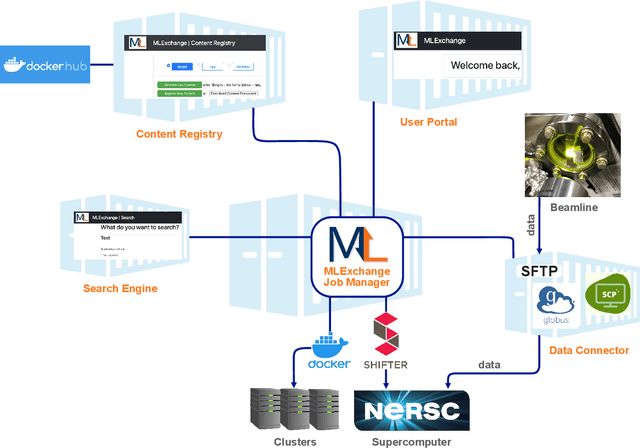
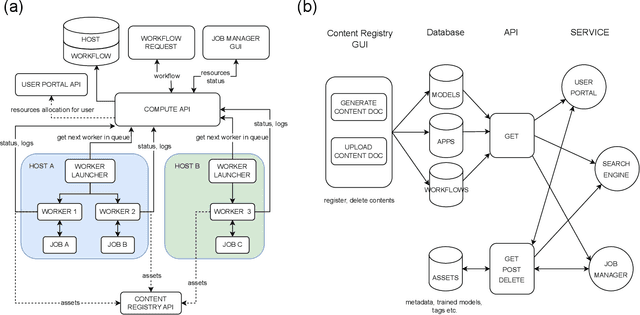
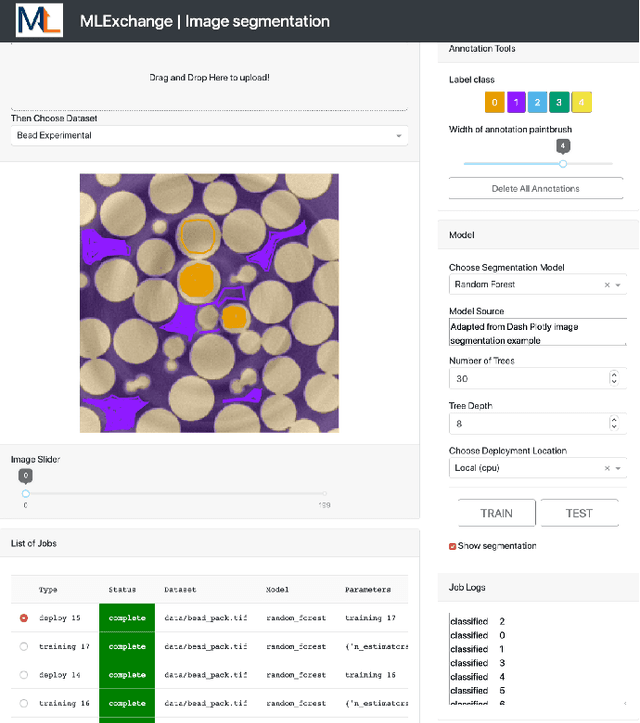
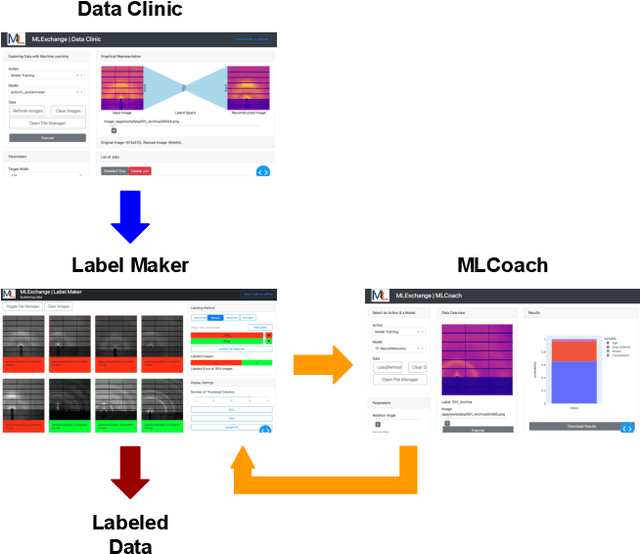
Abstract:Machine learning (ML) algorithms are showing a growing trend in helping the scientific communities across different disciplines and institutions to address large and diverse data problems. However, many available ML tools are programmatically demanding and computationally costly. The MLExchange project aims to build a collaborative platform equipped with enabling tools that allow scientists and facility users who do not have a profound ML background to use ML and computational resources in scientific discovery. At the high level, we are targeting a full user experience where managing and exchanging ML algorithms, workflows, and data are readily available through web applications. So far, we have built four major components, i.e, the central job manager, the centralized content registry, user portal, and search engine, and successfully deployed these components on a testing server. Since each component is an independent container, the whole platform or its individual service(s) can be easily deployed at servers of different scales, ranging from a laptop (usually a single user) to high performance clusters (HPC) accessed (simultaneously) by many users. Thus, MLExchange renders flexible using scenarios -- users could either access the services and resources from a remote server or run the whole platform or its individual service(s) within their local network.
Physics in the Machine: Integrating Physical Knowledge in Autonomous Phase-Mapping
Nov 15, 2021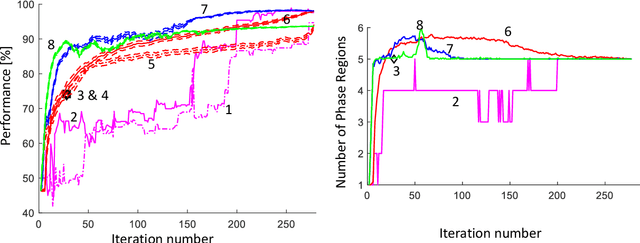
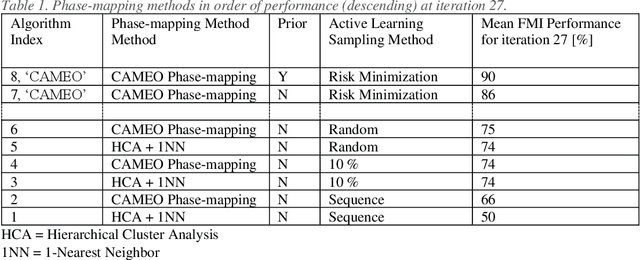
Abstract:Application of artificial intelligence (AI), and more specifically machine learning, to the physical sciences has expanded significantly over the past decades. In particular, science-informed AI or scientific AI has grown from a focus on data analysis to now controlling experiment design, simulation, execution and analysis in closed-loop autonomous systems. The CAMEO (closed-loop autonomous materials exploration and optimization) algorithm employs scientific AI to address two tasks: learning a material system's composition-structure relationship and identifying materials compositions with optimal functional properties. By integrating these, accelerated materials screening across compositional phase diagrams was demonstrated, resulting in the discovery of a best-in-class phase change memory material. Key to this success is the ability to guide subsequent measurements to maximize knowledge of the composition-structure relationship, or phase map. In this work we investigate the benefits of incorporating varying levels of prior physical knowledge into CAMEO's autonomous phase-mapping. This includes the use of ab-initio phase boundary data from the AFLOW repositories, which has been shown to optimize CAMEO's search when used as a prior.
On-the-fly Closed-loop Autonomous Materials Discovery via Bayesian Active Learning
Jun 11, 2020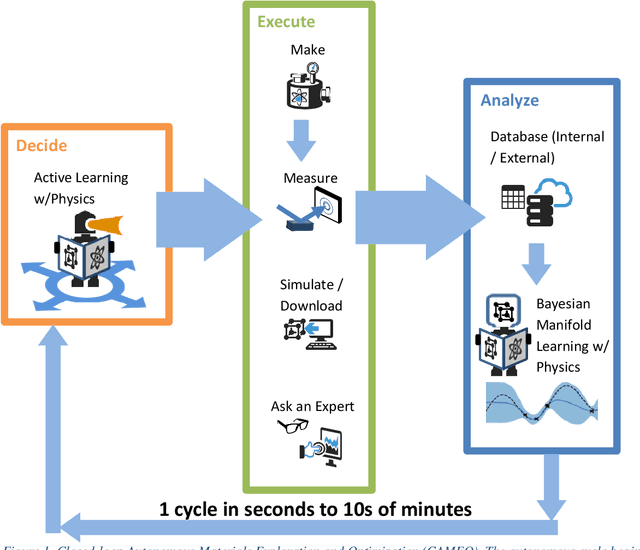
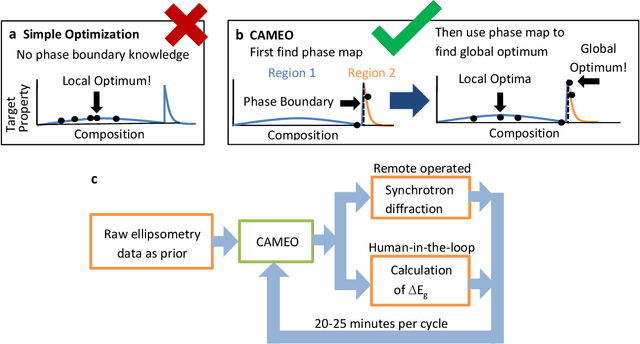
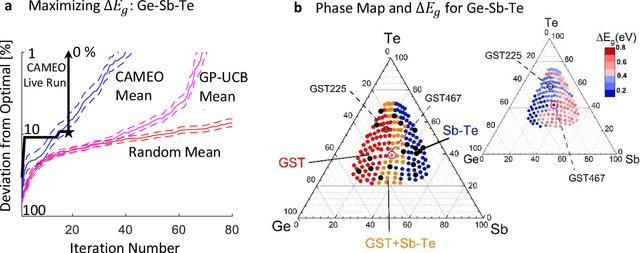
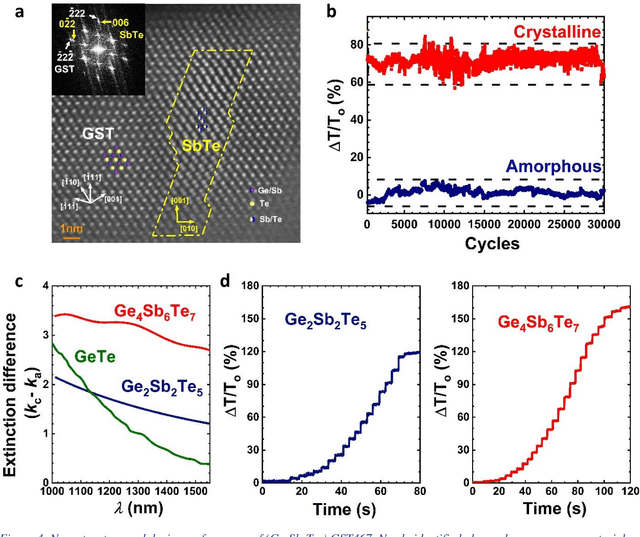
Abstract:Active learning - the field of machine learning (ML) dedicated to optimal experiment design, has played a part in science as far back as the 18th century when Laplace used it to guide his discovery of celestial mechanics [1]. In this work we focus a closed-loop, active learning-driven autonomous system on another major challenge, the discovery of advanced materials against the exceedingly complex synthesis-processes-structure-property landscape. We demonstrate autonomous research methodology (i.e. autonomous hypothesis definition and evaluation) that can place complex, advanced materials in reach, allowing scientists to fail smarter, learn faster, and spend less resources in their studies, while simultaneously improving trust in scientific results and machine learning tools. Additionally, this robot science enables science-over-the-network, reducing the economic impact of scientists being physically separated from their labs. We used the real-time closed-loop, autonomous system for materials exploration and optimization (CAMEO) at the synchrotron beamline to accelerate the fundamentally interconnected tasks of rapid phase mapping and property optimization, with each cycle taking seconds to minutes, resulting in the discovery of a novel epitaxial nanocomposite phase-change memory material.
 Add to Chrome
Add to Chrome Add to Firefox
Add to Firefox Add to Edge
Add to Edge